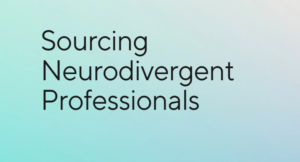
Neurodivergent professionals often encounter obstacles in finding long-term employment due to a lack of understanding from companies. However, many industries are experiencing a shortage of qualified applicants, and neurodivergent individuals can be a valuable source of talent to meet market demands.
Neurodiversity refers to variations in brain functioning that result in unique patterns of thinking, learning, processing, and behavior. Neurodivergent individuals are those who exhibit these variations and are affected by several conditions falling under the neurodiversity umbrella, such as Attention Deficit Disorder, Autism, Dyslexia, and Dyspraxia. As compared to neurotypical individuals, neurodivergent people may face distinct challenges and possess unique strengths.
The richest person in the world Elon Musk has aspergers 🎓🧠
Defining a neurodivergent professional:
A neurodivergent professional is someone who has a neurological difference or variation from the “neurotypical” or typical brain functioning. Examples of neurodivergent conditions include but are not limited to autism, ADHD, dyslexia, Tourette’s syndrome, and bipolar disorder.
Neurodivergent professionals may experience unique challenges in the workplace related to communication, social interaction, sensory processing, or executive functioning. However, they may also possess strengths and skills such as attention to detail, creativity, problem-solving, and specialized interests.
Employers and colleagues can create an inclusive work environment by recognizing and accommodating neurodivergent individuals’ diverse needs and strengths. This may include providing clear communication, flexible work arrangements, sensory accommodations, and alternative forms of feedback or evaluation. By embracing neurodiversity, companies can harness the benefits of a diverse workforce and improve the well-being and productivity of all employees.
How to make your recruiting process more inclusive?
Here are some ways to create a better and more inclusive hiring process for a neurodivergent candidate:
Use inclusive language in job descriptions and postings that are free from stereotypes and negative language that may deter neurodivergent candidates.
Provide clear and explicit information about the job requirements and application process, including any accommodations that may be available for neurodivergent applicants.
Consider alternative forms of communication, such as email or video conferencing, to accommodate neurodivergent candidates who may have difficulty with phone or in-person conversations.
Create a structured and predictable interview process that minimizes surprises and reduces anxiety for neurodivergent candidates. Provide advance notice of interview questions and any skills assessments.
Consider alternative assessments or job trials that focus on the candidate’s strengths and skills rather than traditional interview questions.
Provide reasonable accommodations such as flexible work arrangements, assistive technology, or adjustments to the work environment to support neurodivergent employees once they are hired.
Educate recruiters and hiring managers on neurodiversity and provide training on inclusive hiring practices.
By implementing these strategies, employers can create a more inclusive hiring process that welcomes and values neurodivergent candidates and promotes diversity and inclusion in the workplace.
Creating a better candidate experience:
Creating a positive candidate experience for someone with a disability is crucial for fostering an inclusive workplace and attracting top talent. Here are some ways to create a better candidate experience for individuals with disabilities:
Make the application process accessible: Ensure that the application process is accessible to individuals with disabilities. This includes having a website that is easy to navigate and compatible with screen readers, providing alternative application methods (e.g., email or paper-based applications), and offering accommodations such as extended time or a quiet space for completing applications.
Provide clear and transparent communication: Keep candidates informed about the hiring process, including timelines, expectations, and any accommodations that may be available. Communicate in clear and concise language, and provide information in multiple formats (e.g., email, phone, and in-person) to accommodate individual preferences.
Address any accessibility concerns: If a candidate has specific accessibility needs, such as wheelchair access or sign language interpretation, make the necessary arrangements ahead of time to ensure that the interview process is accessible and comfortable.
Focus on the candidate’s strengths: During the interview process, focus on the candidate’s strengths and abilities rather than their disability. This can help the candidate feel valued and appreciated for their unique contributions.
Offer a virtual or in-person tour of the workplace: Providing a virtual or in-person tour of the workplace can help the candidate feel more comfortable and confident about accepting a job offer. It can also provide an opportunity to address any accessibility concerns or questions they may have.
Follow up with candidates: After the interview process, follow up with candidates to thank them for their time and provide feedback on their application. This can help to build a positive relationship with the candidate and promote future engagement with the company.
Boolean string examples:
Here are some examples of Boolean string search terms that can help recruiters identify potential neurodivergent candidates:
(“neurodivergent” OR “neurodiverse” OR “neurodiversity”) AND (“professional” OR “employee” OR “candidate”) This search targets individuals who self-identify as neurodivergent and have experience as professionals, employees, or candidates.
(“autism” OR “ADHD” OR “dyslexia” OR “dyspraxia”) AND (“job” OR “career” OR “position”) This search targets individuals who may have a specific neurodivergent condition and are seeking employment opportunities.
(“neurodivergent” OR “neurodiversity”) AND (“talent acquisition” OR “recruiter” OR “hiring manager”) This search targets recruiters or hiring managers who specialize in talent acquisition and have experience working with neurodivergent individuals.
(“reasonable accommodations” OR “ADA compliance” OR “accessibility” OR “inclusivity”) AND (“job” OR “career” OR “position”) This search targets individuals who may have specific needs or require reasonable accommodations in the workplace.
By using these Boolean strings or similar ones, recruiters can identify candidates who may be neurodivergent and have skills and talents that can benefit their organization. However, it’s important to note that these searches should be used with sensitivity and an understanding of the individual’s privacy rights.
Final Thoughts…
Neurodivergent professionals can possess unique strengths and skills that can benefit employers, and it is important for employers to recognize and support them throughout the recruiting process. Recruiters can benefit from researching and better understanding neurodivergent individuals to create a more inclusive and positive candidate experience.
During my childhood, I came to realize that I had dyslexia which posed several challenges in learning and reading as I grew up. However, I now consider this to be a blessing in disguise as it has enabled me to tap into my creative abilities. I possess a unique ability to perceive problems from various perspectives which has greatly enhanced my skills in talent sourcing and my profession. Overcoming these obstacles has instilled in me an unparalleled level of perseverance and grit that sets me apart from others.
- Unlocking the Power of Perplexity AI: Why Recruiters Should Utilize This Revolutionary Tool - February 11, 2024
- Exploring AI Interviewing Assessment Tools: A Comprehensive Review - November 30, 2023
- PartyRock a Sandbox for Talent Sourcing - November 29, 2023
